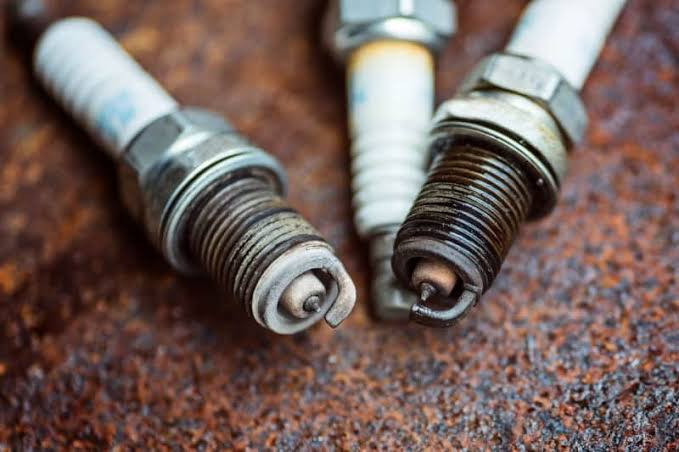According to Consumer Reports, some modern engines can burn through an entire quart of oil between scheduled maintenance intervals. That's not "normal" despite what some manufacturers claim. When you discover oil coating your spark plugs, your engine is crying for help.
"My car still runs fine!" That's what most drivers tell me when I explain their oil fouled spark plugs need immediate attention. They're wrong. Dead wrong.
What Oil on Spark Plugs Really Means
Oil doesn't belong anywhere near your spark plugs. Period. When you pull a plug and find it slick with black, tar like residue, your engine has a serious internal problem that won't fix itself.
This condition interrupts the electrical flow between the spark plug electrodes. The result? Misfires that rob power, kill fuel economy, and damage your catalytic converter. I've seen $2,000 catalytic converter replacements that could have been prevented with a $300 repair.
Your check engine light will likely illuminate with diagnostic codes starting with P030. These misfire codes are your engine's distress signal.
The Real Cause Behind Oil Fouled Plugs
Worn Valve Seals and Guides
These rubber seals prevent oil from dripping into the combustion chamber when your engine is off. After 100,000 miles, they harden and crack. Oil seeps past them during overnight parking, coating your plugs by morning.
Failed Piston Rings
Piston rings seal the combustion chamber from the oil-filled crankcase below. When they wear out or break, oil gets sucked up into the cylinders with each intake stroke. This creates the worst oil consumption problems I see in the shop.
Blown Head Gasket
A blown head gasket allows oil passages to leak into the cylinders. You'll often see milky oil on the dipstick or coolant loss alongside the fouled plugs. This repair can cost $1,500 to $3,000 depending on your vehicle.
Clogged PCV System
Your Positive Crankcase Ventilation system removes pressure from the engine's oil compartment. When it clogs, pressure builds up and forces oil past seals and rings. A $20 PCV valve replacement often solves the problem.
Warning Signs You Can't Ignore
Rough Idle and Hesitation
Your engine will shake at idle and hesitate during acceleration. "It's getting old," drivers tell me. Age doesn't cause misfires. Oil-fouled plugs do.
Excessive Oil Consumption
If you're adding oil between changes, your engine burns oil somewhere. Modern engines should consume less than one quart per 3,000 miles under normal conditions.
Blue Smoke from Exhaust
Blue smoke during startup or acceleration means oil is burning in the cylinders. The damage is already happening.
Poor Fuel Economy
Misfiring cylinders waste fuel. That "gas guzzling" behavior might be oil-fouled plugs robbing 10-15% of your fuel economy.
Diagnostic Steps
Visual Inspection
Remove each spark plug and examine it carefully. Oil fouled plugs show wet oil on the threads or black, carbon buildup on the electrode and insulator. Clean plugs indicate that cylinder is healthy.
Compression Test
This test reveals if piston rings are sealing properly. Low compression in cylinders with fouled plugs confirms ring problems.
Leak Down Test
This advanced test pinpoints whether valve seals, head gaskets, or piston rings cause the oil consumption. It's worth the diagnostic fee to identify the exact problem.
Repair Solutions and Real Costs
Immediate Fixes
Replace the fouled spark plugs first. Quality plugs cost $8 to 15 each, and installation runs $150 - 250 total at most shops. This restores engine performance temporarily but doesn't fix the root cause.
PCV System Service
Replace the PCV valve and clean the system. Parts cost $15 - 40, with one hour of labor. This fixes many oil consumption issues in high-mileage vehicles.
Valve Seal Replacement
This repair costs $800 - 1,500 depending on engine complexity. The cylinder head must be removed, making this a significant repair. However, it permanently solves valve seal oil leaks.
Ring Replacement
Worn piston rings require complete engine disassembly. Costs range from $2,500 - 4,000. At this price point, many owners opt for engine replacement or vehicle retirement.
Prevention Strategies
Use Correct Oil Viscosity
High mileage engines often benefit from slightly thicker oil that doesn't slip past worn seals as easily. Switch to high mileage formula oil after 75,000 miles.
Maintain Regular Oil Changes
Fresh oil contains detergents that keep seals pliable and reduce oil consumption. Extending change intervals accelerates seal deterioration.
Address Small Leaks Immediately
"It's only a few drops," drivers tell me about valve cover gasket leaks. Those drops indicate seal degradation that will worsen rapidly.
Monitor Oil Level Monthly
Check your dipstick monthly to catch oil consumption problems early. Waiting until the oil change appointment can miss developing issues.
Oil fouled spark plugs signal expensive engine problems that worsen with time. Acting quickly when you spot the first signs can save thousands in repair costs. Ignoring the problem guarantees catastrophic failure.
"I'll drive it until it dies," is the most expensive automotive decision you can make. Smart drivers fix small problems before they become big ones.
The average spark plug replacement costs $200 to 400 including labor. Compare that to $3,000 for engine replacement, and the choice becomes clear. Your engine is telling you what it needs. Listen to it.

Comments (0)
Please login to join the discussion
Be the first to comment on this article!
Share your thoughts and start the discussion